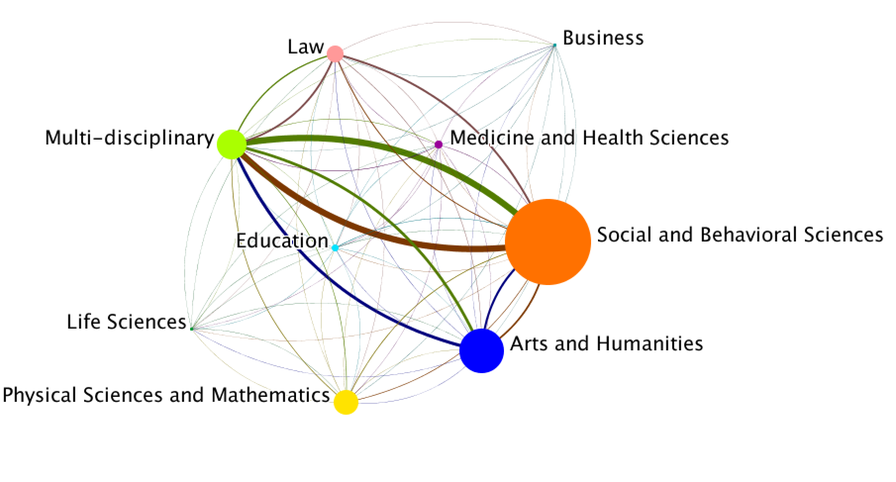The Failed Migration of Academic Twitter (to Mastodon)

my notes ( ? )
This preprint "looks at the dynamics of this migration" from X to Mastodon of academics: using "publicly available user account data, we track the posting activity of academics on Mastodon over a one year period... gathered follower-followee relationships ... finding that the subset of academics ... were well-connected. However, this strong internal connectivity was insufficient to prevent users from returning to Twitter/X", although "communities that established field specific server instances had higher user retention rate".
(my emphases) They identified "significant challenges sustaining user engagement on Mastodon due to its decentralized structure ... [+] competition from ... Bluesky and Threads... emphasizing the need for focus on community building for long-term user engagement."
Key points
- tracked 7,542 academics who joined Mastodon around the Nov 2022 migration ... regular activity dropped to ~2,400 (-70%). "each month, approximately 10% to 20% ... stopped actively using the platform"
- activity and engagement lower than on Twitter - even for "persistent users [who] continued to post regularly... growth in their connections remained slow... highlights the challenges faced in establishing and expanding social ties and communities on Mastodon"
- Tight, pre-coordinated local communities helped - eg academics who set up field-specific server instances showed higher retention, reflecting Masto's server-based architecture: "stronger within-instance ties compared to weaker links across instances" (but: wouldn't that also reflect the greater investment they/their friends made?)
- some 3,131 academics also gave their Twitter accounts. Most returned to Twitter or never left: the "core group of loyal users who have fully migrated to Mastodon... make up a relatively small portion":
- 80% remained active on Twitter,
- 7% reduced their Twitter activity, another ~13% won't return to twitter (locked or inaccessible accounts)
- 50% active on both
- social lock-in: "while scholars who migrated to Mastodon made efforts to establish a new community, it is nowhere near the scale of connections they built over the years on Twitter... [which is] not easily replicable or discarded... highlights the difficulty of transitioning ... without sacrificing years of accumulated influence and community ties"
- They also looked a little at Bluesky & Threads, finding "that scholars are exploring various alternatives rather than committing to Mastodon... competition from more user-friendly platforms like Bluesky and Threads potentially drew users away from Mastodon"
Key conclusions
- Mastodon architecture problems: content discovery, smaller audiences, fragmented moderation and tooling
- critical mass and easy discoverability essential
- community convenor leadership essential but insufficient:
- move communities, not individuals, in a coordinated way
- but even coordination (many academics moving together) didn’t sustain activity
- voluntary, community-led growth around clear incentives essential
- migrate in stages (cf eXit strategy): treat decentralized platforms as supplementary channels, at least to begin with
- pilot with focused communities: field-specific communities, working groups...
- provide incentives, focusing on unique features Twitter lacks (cf adoption strategy - particularly custom feeds on Bluesky)
- provide discoverability, onboarding with quality moderation & governance
- on Bluesky: custom feeds, starter packs...
- Mastodon: crossposting
- be professional: measure stuff and act on it
Also interesting
- "The highest proportion of persistent users is observed within multidisciplinary researchers... Researchers in the physical sciences and mathematics have notably higher average number of posts... Scholars in medicine and health sciences exhibit relatively less"
Notes
- preprint from Oct 2024, doesn't seem to have been published (Google scholar, lead author)
- self-selection: dataset is academics who self-identified as part of the migration - ie early adopters, not representative of all scientists
Many interesting-looking references, such as:
- Challenges in the decentralised web: The mastodon case. In Proceedings of the internet measurement conference. 217–229.
- "A study of users migrating from Twitter to Mastodon post-Musk’s acquisition indicated that social influence, network structure, commitment, and shared identity significantly drive collective behavior changes in online communities" - Lucio La Cava, Luca Maria Aiello, and Andrea Tagarelli. 2023.Drivers of social influence in the Twitter migration to Mastodon.Scientific Reports 13, 1 (2023), 21626.
- "Twitter-to-Mastodon migration was characterized by low Twitter account deletion rates, concentration of users in large Mastodon instances ... " - Jiahui He, Haris Bin Zia, Ignacio Castro, Aravindh Raman, Nishanth Sastry, and Gareth Tyson. 2023.Flocking to mastodon: Tracking the great twitter migration. In Proceedings of the 2023 ACM on Internet Measurement Conference. 111–123.
- "similar study on Twitter-to-Mastodon migration revealed lower user engagement and posting activity on Mastodon " - Ujun Jeong, Paras Sheth, Anique Tahir, Faisal Alatawi, H Russell Bernard, and Huan Liu. 2023.Exploring platform migration patterns between twitter and mastodon: A user behavior study.
In contrast "Our work looks more deeply at the specific case of the relatively well-synchronized and coordinated movement of communities of academic users across platforms."
Read the Full Post
The above notes were curated from the full post arxiv.org/html/2406.04005v2.Related reading
More Stuff I Like
More Stuff tagged community , twitter , threads , bluesky , mastodon , science
See also: Bluesky and the ATmosphere , Fediverse , Online Community Management , Social Media Strategy , Social Web , Politics , Communications Strategy , Science&Technology